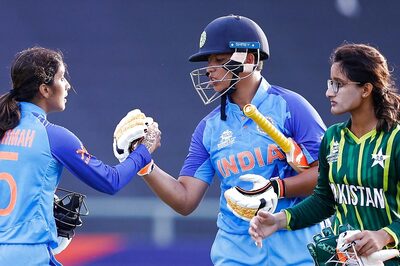
views
Dhaka: Bangladeshi President Iajuddin Ahmed was consulting feuding party leaders on Sunday to try to defuse a mounting crisis over forming a caretaker government to steer the nation through to January general elections.
The deadlock over a caretaker has triggered political clashes that have killed 19 people and injured hundreds the past three days across the impoverished country of 140 million people. The president first intervened on Saturday, the day Prime Minister Begum Khaleda Zia's five-year mandate expired and former Supreme Court chief justice K M Hasan was to have taken charge of an interim administration to prepare for national elections.
The former judge withdrew just hours before he was due to be sworn in in the face of opposition parties adamant objections to the arrangement, claiming Hasan was a government stooge.
"It is best I should stand aside rather than be a hurdle to the political process," Hasan said in a statement on Saturday. Iajuddin then proposed taking his place in a compromise that Khaleda's Bangladesh Nationalist Party (BNP) appeared to favour but the main opposition Awami League rejected.
The caretaker authority's job is run the government in a three-month run-up to a general election, and then hand power to a newly elected team. State of emergency? Fierce street battles which erupted on Friday continued at different places on Sunday, killing three more people to take the toll to 19, police said.
"We are still facing a dangerously turbulent situation," said one police officer. "Anything may happen anytime." Thousands of protesters, carrying sticks and chanting slogans, gathered in central Dhaka on Sunday for a planned afternoon rally. Protesters blocked roads, burned vehicles, and attacked BNP offices and the homes of some ministers, police and witnesses said.
The chiefs of the army, navy and air force met Khaleda on Sunday, spreading speculation about a possible state of emergency being declared. "This may be just a farewell call, as the PM is about to formally step down," said an official.
"On the other hand, maybe they have discussed the prevailing situation and possible way out, let's say a state of emergency."
Other sources said the armed forces had been put on alert to act at short notice as the country might lurch into far worse violence if the president takes charge of the interim administration. President Iajuddin summoned the leaders of two smaller parties to his official residence on Sunday to discuss the issues, a presidential spokesman said, without giving details.
The spokesman said the president was expected to meet BNP and Awami leaders for further talks later. The Awami League denounced what it called a BNP conspiracy. "I can smell a conspiracy in the attempts to put the country's president in charge of the interim government," Awami leader Sheikh Hasina, a former prime minister, told reporters.
Under the constitution, Hasan, as the immediate past chief justice, was the first choice to head the interim administration. If he declined or was deemed unfit, one of his predecessors, not above the age of 72, should be chosen instead.
Two other former chief justices — Mahmudul Amin Chowdhury and Hamidul Haque—fit that category. The opposition said they had no objection to either of them. But the ruling BNP and its allies in the Jamaat-e-Islami party are believed to object to either man, officials monitoring the transition said.
Legal experts say the president can head a caretaker team only if no retired chief justice-or non-political, non-partisan figure acceptable to all parties — is available. The southern port of Chittagong remained idle as the opposition enforced an indefinite strike there.
The strike is hitting the country's $8 billion a year garment export business, said SM Fazlul Haque, president of the Bangladesh Garment Manufacturers and Exporters Association.




















Comments
0 comment